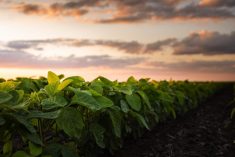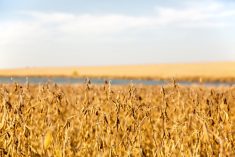Buenos Aires | Reuters –– Argentine farmers will suspend grain sales for three days to protest export quotas and other government policies they say hurt profits, the country’s main growers’ organizations said Tuesday.
The strike will start on Wednesday, March 11, leaders of three of Argentina’s biggest farm groups told a press conference.
“This action is taken to mark our rejection of the government’s agriculture policies, which have caused a critical situation for the country’s farmers,” said Luis Etchevehere, head of the Argentine Rural Society, which represents some of the country’s main agricultural producers.
Read Also

U.S. grains: Soybeans touch 16-month high, wheat firm on Chinese demand hopes
Chicago soybean futures hit 16-month highs on Monday on expectations China will restart large-scale U.S. soy buying after the two countries reached a deal to de-escalate their trade war.
The government of President Cristina Fernandez was shaken by a widespread farm rebellion in 2008 that reduced exports for months and cut into government revenue. Relations between her and the grains sector have been strained ever since.
Fernandez is constitutionally barred from running for a third consecutive term in the October general election.
Growers say they will act to make sure they are heard as presidential candidates campaign in the months ahead.
The three strongest candidates so far — Buenos Aires Mayor Mauricio Macri, Congressman Sergio Massa and Buenos Aires Governor Daniel Scioli — are all seen by the sector as more farm-friendly than Fernandez.
Argentina is the world’s No. 3 soybean exporter and top supplier of soymeal livestock feed and soyoil.
The Fernandez government levies a 35 per cent tax on soybean exports and restricts corn and wheat shipments under a system meant to ensure ample domestic food supplies, but farmers say that restricts their markets and makes crop planning difficult.
High inflation and a wobbly local peso currency have prompted an increase in soy hoarding in recent years, as farmers pile their beans into the white, oblong silo-bags that have come to dot the Pampas grains belt.
— Reporting for Reuters by Maximilian Heath; writing by Hugh Bronstein.











